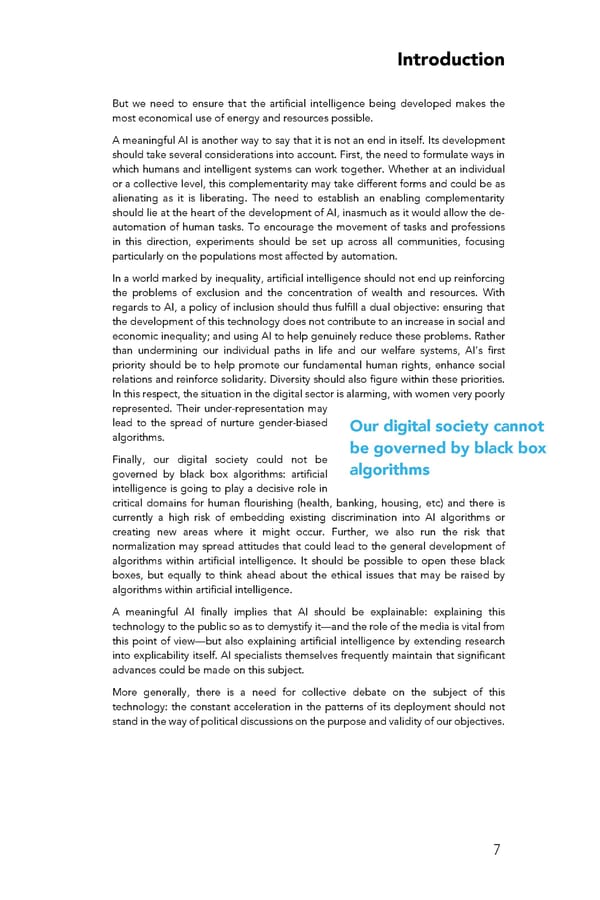Introduction But we need to ensure that the artificial intelligence being developed makes the most economical use of energy and resources possible. A meaningful AI is another way to say that it is not an end in itself. Its development should take several considerations into account. First, the need to formulate ways in which humans and intelligent systems can work together. Whether at an individual or a collective level, this complementarity may take different forms and could be as alienating as it is liberating. The need to establish an enabling complementarity should lie at the heart of the development of AI, inasmuch as it would allow the de- automation of human tasks. To encourage the movement of tasks and professions in this direction, experiments should be set up across all communities, focusing particularly on the populations most affected by automation. In a world marked by inequality, artificial intelligence should not end up reinforcing the problems of exclusion and the concentration of wealth and resources. With regards to AI, a policy of inclusion should thus fulfill a dual objective: ensuring that the development of this technology does not contribute to an increase in social and economic inequality; and using AI to help genuinely reduce these problems. Rather than undermining our individual paths in life and our welfare systems, AI’s first priority should be to help promote our fundamental human rights, enhance social relations and reinforce solidarity. Diversity should also figure within these priorities. In this respect, the situation in the digital sector is alarming, with women very poorly represented. Their under-representation may lead to the spread of nurture gender-biased Our digital society cannot algorithms. be governed by black box Finally, our digital society could not be algorithms governed by black box algorithms: artificial intelligence is going to play a decisive role in critical domains for human flourishing (health, banking, housing, etc) and there is currently a high risk of embedding existing discrimination into AI algorithms or creating new areas where it might occur. Further, we also run the risk that normalization may spread attitudes that could lead to the general development of algorithms within artificial intelligence. It should be possible to open these black boxes, but equally to think ahead about the ethical issues that may be raised by algorithms within artificial intelligence. A meaningful AI finally implies that AI should be explainable: explaining this technology to the public so as to demystify it—and the role of the media is vital from this point of view—but also explaining artificial intelligence by extending research into explicability itself. AI specialists themselves frequently maintain that significant advances could be made on this subject. More generally, there is a need for collective debate on the subject of this technology: the constant acceleration in the patterns of its deployment should not stand in the way of political discussions on the purpose and validity of our objectives. 7
 For a Meaningful AI - Report Page 7 Page 9
For a Meaningful AI - Report Page 7 Page 9